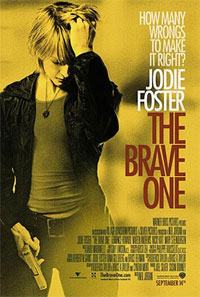 It’s intriguing how many current films address questions of revenge and justice. Like all cinematic epidemics, this is a mixed bag, from Quentin Tarantino’s alternately boring and horrifying car-crash fest Death Proof, just released on DVD, to the slasher-style terror of Death Sentence starring Kevin Bacon, to the mature and moving reflection on justice and fatherhood in 3:10 to Yuma, to the ostensibly more thoughtful treatment of vengeance in Jodie Foster’s new film The Brave One.
It’s intriguing how many current films address questions of revenge and justice. Like all cinematic epidemics, this is a mixed bag, from Quentin Tarantino’s alternately boring and horrifying car-crash fest Death Proof, just released on DVD, to the slasher-style terror of Death Sentence starring Kevin Bacon, to the mature and moving reflection on justice and fatherhood in 3:10 to Yuma, to the ostensibly more thoughtful treatment of vengeance in Jodie Foster’s new film The Brave One.
The Brave One begins with a murder that the filmmakers show in subtle but horrendous detail. We really feel the loss of human life that occurs when her character’s boyfriend is beaten to death in front of her. Her subsequent fear and desire for revenge are presented as entirely natural responses; in this regard, the film is intelligent and humane. Far too many representations of the aftermath of violence in popular culture refuse to treat it with respect. But when she actually starts killing people, despite the fact that her victims are all portrayed as evil, the movie becomes something other than the serious exploration of how to deal with violence that it purports to be. The victim becomes a perpetrator, and the audience is made complicit.
Throughout its two-hour running time, I hoped the film would suggest that the revenge Foster’s character takes does her more harm than good, and certainly does not end or even come close to challenging the spiral of violence in the world. My hope was unfounded, for the film not only presents its protagonist as doing what is normal, but ultimately endorses her violence as the only way to resist evil. In a world where finding alternatives to conflict-as-usual may be our greatest challenge, we desperately need more nuanced investigations of how to respond to violent threats and injustices than this.
What’s surprising is that both Jodie Foster and her director, Neil Jordan, know better than this, having between them made smarter films such as The Accused and The Crying Game. But in producing The Brave One, a film that appears to co-opt the values of the war on terror into the domestic life of a character who works for an NPR-style radio station, they have created what The New York Times has called “a pro-lynching film that even liberals can love.” Of course, doing nothing in response to injustice will not make the world a less violent place, but neither will suggesting that the only thing we can do is to use the same tactics as our opponents.
 Gareth Higgins is a Christian writer and activist in Belfast, Northern Ireland. For the past decade he was the founder/director of the zero28 project, an initiative addressing questions of peace, justice, and culture. He is the author of the insightful How Movies Helped Save My Soul and blogs at www.godisnotelsewhere.blogspot.com
Gareth Higgins is a Christian writer and activist in Belfast, Northern Ireland. For the past decade he was the founder/director of the zero28 project, an initiative addressing questions of peace, justice, and culture. He is the author of the insightful How Movies Helped Save My Soul and blogs at www.godisnotelsewhere.blogspot.com

